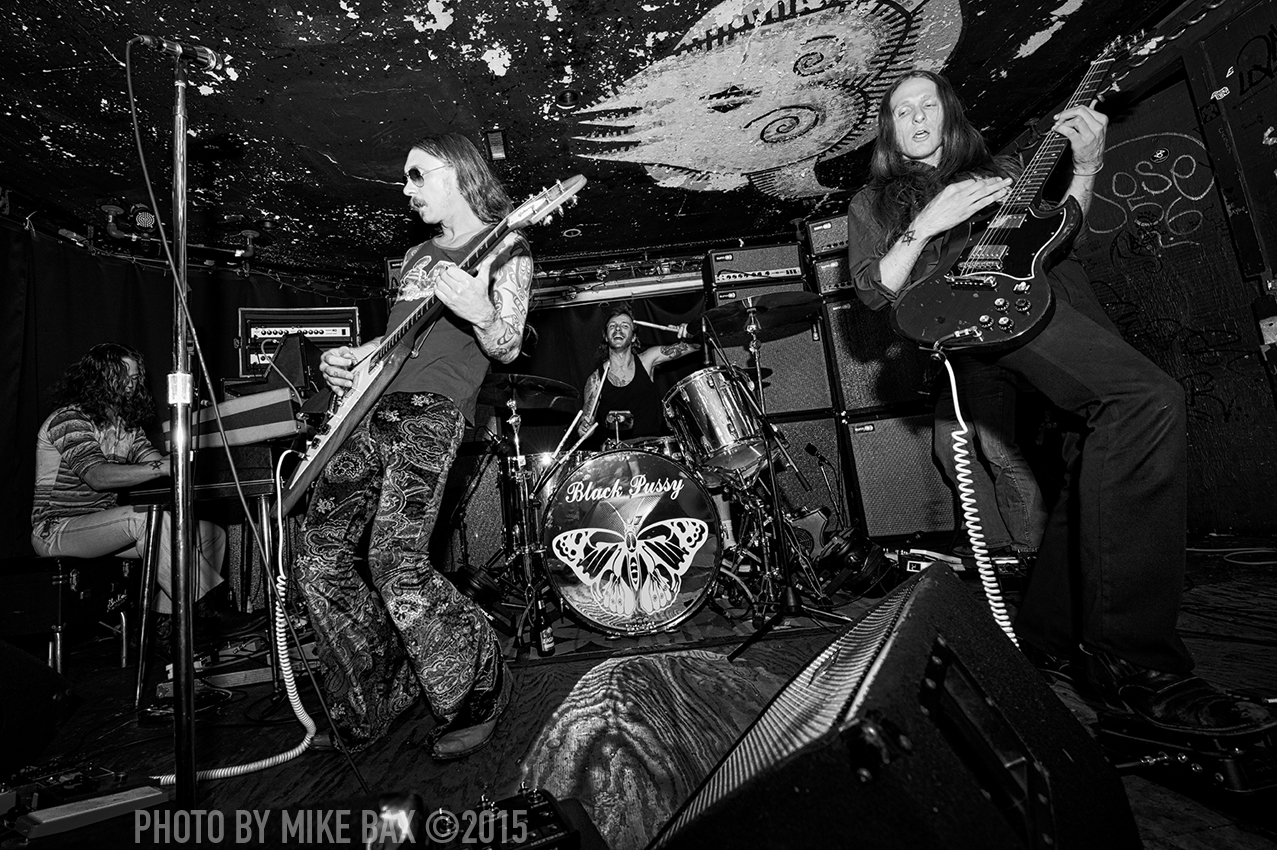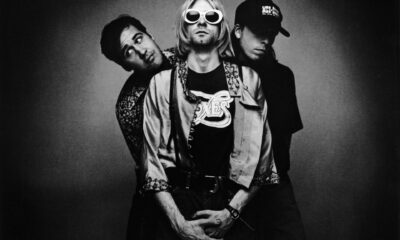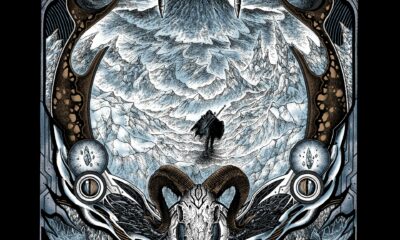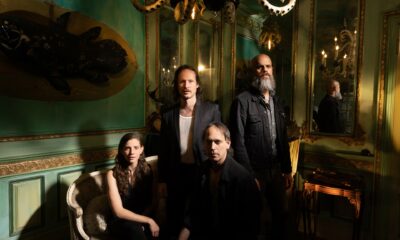Interviews
Interview with Dustin Hill of Black Pussy – May 28th, 2015
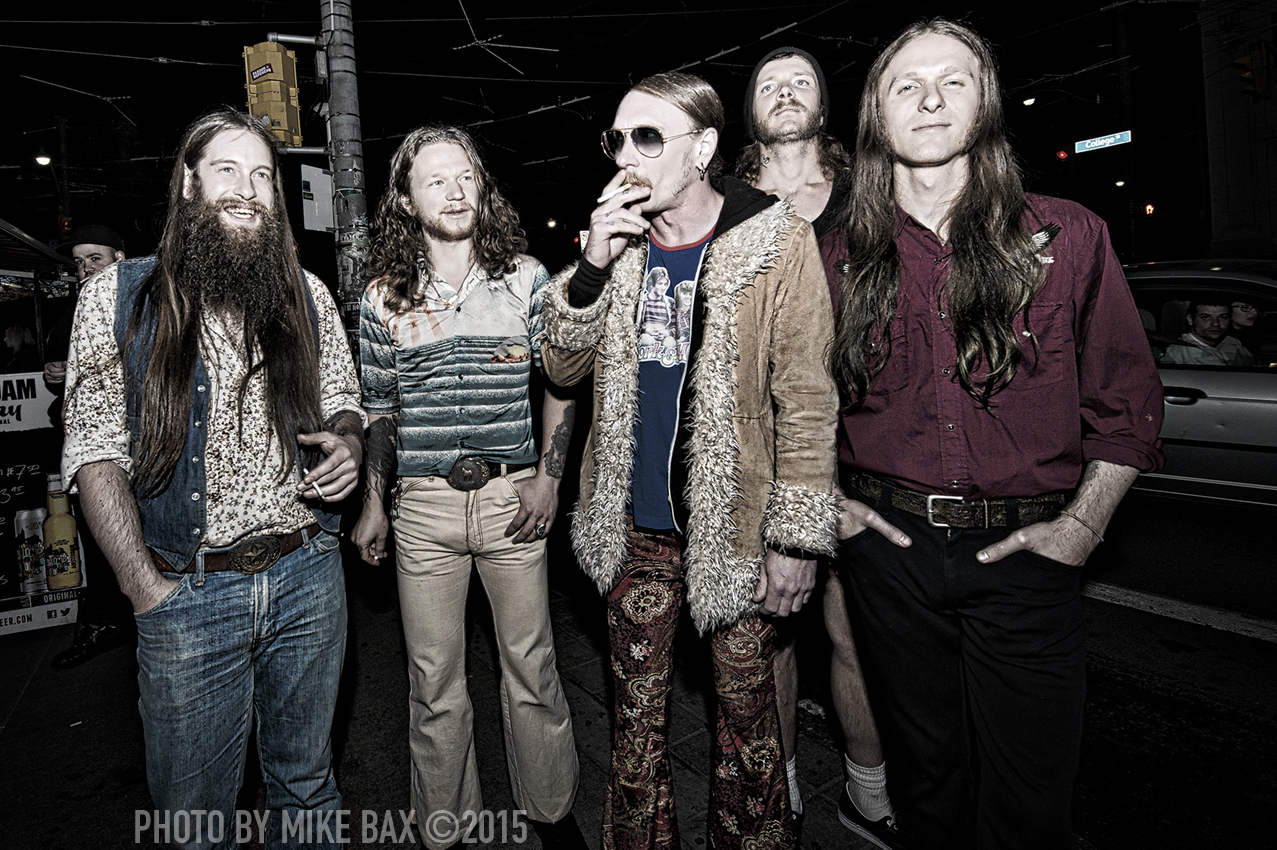
Interview and photos by Mike Bax
If you were to simply Google Black Pussy, you *might* not like the results that your search would reveal. Googling “Black Pussy band” however, would get you to the bandcamp page of the five individuals making original music sounding like the lovechild of early 1970’s psychedelia bands mixed with a dash of Sabbath and Kyuss.
There’s no shortage of controversy over the band’s name online and in the news. Journalists, most of whom aren’t even taking the time to vet the band’s material before broadcasting their right-wing slant towards the band, are painting up boycott propaganda towards Black Pussy for the use of a moniker that they feel suggests something salacious. It’s there (to be sure) but like anything in life, taking the time to look a little deeper into the band and their musical roots will yield a few full length albums and some EPs and singles under the band names Black Pussy and White Orange.
Both of these bands, the brain-child of guitarist songwriter Dustin Hill (interviewed here by phone this past Thursday) shine brightly with contagious guitar riffs, harmonizing vocals and a deep-rooted love for music decades gone by. Controversy aside, the music of Black Pussy and White Orange DESERVES your attention. If the mechanism that steers you towards his music is controversy over the name Black Pussy, then Dustin seems just fine about that.
Dustin: I’m sure you are getting a kick out of all of this Canadian controversy all of a sudden.
Mike: Well, we talked a little bit about the online attention towards your name when we were together in Toronto a few weeks ago. It seems like it all started about 6 or 7 months ago and just keeps getting recycled online. It’s like this thing that won’t get off the internet for Black Pussy. It’s curious because Nashville Pussy, Anal C#nt and the Dayglo Abortions all seemed to have made out ok over the years. So what’s REALLY wrong with Black Pussy?
Dustin: It’s just a sign of the times – people being very sensitive to the sexuality and race classification. We’ve created so much segregation that people are becoming very sensitive, which is strange to me. I wouldn’t say it’s everyone. I think the majority of the population is not that way. But I think the internet facilitates a place for people to have control and a voice – I don’t think these types of people really speak up in a face-to-face situation, if you know what I mean.
Mike: I know exactly what you mean. There is a level of anonymity on the internet where anyone can smack-talk anything. There’s no recourse.
Dustin: Yeah. (Laughter)) But whatever. To me it’s very beneficial.
Mike: I love that people assume its ‘black female genital’ and not a black cat. There’s nothing in your music or lyrics to sell the former. People aren’t even playing the album. It’s a lynch mob mentality.
Dustin: Right. And the thing is I hold fast to the band name as being ambiguous. I haven’t even put a meaning to it. The words are ambiguous and they are ambiguous together. I like art where the artist doesn’t give away the meaning – they leave it up to you. To let it inspire something within you. It’s made for some strange controversy. It’s good. It seems that it’s actually helping. It’s a good thing for our band because publicity is publicity.
Mike: Yeah.
Dustin: But beyond that, it’s causing conversation from all different sides and viewpoints. I think that’s important in today’s social climate. I think people really want to have these discussions and somehow we’re facilitating the platform for it.
Mike: So, you’re never in the van thinking: ‘Why the fuck didn’t we just forge on with White Orange?’
Dustin: (laughter) No. I’m actually good with it. Most bands would pay big money for publicity like this is getting. It’s bad publicity. But it’s publicity nonetheless. Mike Patton once said that there is no better publicity than bad publicity, short of murdering someone or something heinous like that, I guess. Publicity, especially in rock n roll, I think it brings out a certain spirit. People are looking for that spirit. We’re like a beacon for that in our own way. People into this sort thing will check us out now. I think it’s beneficial.
Mike: What prompted the move away from White Orange to Black Pussy? If that was even a thing? I’m assuming White Orange is old news here…
Dustin: Not really. White Orange is three members of Black Pussy and Adam Pike, who plays bass. Adam and I run a studio together. Actually, I’m a silent partner in a studio with him. He’s my engineer. He has recorded most of my albums. He does front of house for Red Fang. Adam got really busy. He’s on tour with Red Fang all the time and that didn’t allow White Orange to tour. I had Black Pussy going on simultaneously. I was doing Black Pussy, I was doing White Orange, I was doing another band as well. White Orange is still a very important thing. I think some of the songs that would have been White Orange are coming into Black Pussy now. I think I’m just combining them. The idea of White Orange was that it was a very specific type of music. With Black Pussy the mantra was to be able to do anything. It’s allowing for heavier White Orange songs to come in. And, as you can see on both Black Pussy records, Adam has played on a song or two. On ‘Magic Mustache’ Adam did back-ups on a majority of the songs. He played bass on a song. Adam is still a part of the family. It’s not like I moved away from White Orange, you know? I’m the writer of White Orange 100% and I’m 100% writer of Black Pussy. I could call both bands Dustin Hill, you know? I like band names. I like the IDEA of a band. White Orange is very important to me and I’m sure we will track another record under that umbrella, and he will still be a part of Black Pussy. From my perspective, there really is no difference between the bands. All the songs are coming out of me. I couldn’t put ‘On Blonde’ out under White Orange. That was a very specific type of album that I wanted to do. That would be the only difference, I guess. I’m building Black Pussy so that whatever type of album I put out it’s more accepted. If I put out ‘On Blonde’ via the White Orange title I think it would have freaked people out.
Mike: You’ve written songs about Farah Fawcett and Sigourney Weaver. What is it about these two actresses that inspired you to pen songs about them?
Dustin: (Laughs) Well, Farah Fawcett is amazing. I think my favourite film she’s in was Logan’s Run. Being a child of the seventies and growing up on Charlie’s Angels, she was a huge sex symbol and an amazing actress. She was a big part of my childhood. It wasn’t like I intentionally set out to write a song about Farah Fawcett. If you listen to the lyrics it’s a very fictional thing. I kind of write in a meditative state. A lot of times I let the words just come out of my mouth. I don’t really edit myself. Or should I say, I really don’t edit the universe. The universe just allowed me to sing that particular. Sigourney Weaver is the same sort of thing. It wasn’t a thought out concept. It’s just how it came out. Those are two amazing actresses. I have a lot of respect for those two women and I feel blessed that the universe gave me those two songs to put into this dimension.
Mike: Where does the original of Sigourney Weaver actually live? It’s not actually on the album proper for White Orange, is it? Is it a b-side to a 45?
Dustin: No, it’s actually on the full length White Orange album.
Mike: Is it a buried track? When I bought the vinyl I only got a download key for eight songs.
Dustin: It’s not a buried track. It’s on there. Maybe it’s only on the vinyl. I don’t know if it’s on the CD. I can’t remember if it’s on the CD or not. 100% it’s on the vinyl. We put out a double LP for that full length, and it’s the last song on the record all by itself on the last side of the vinyl. It plays really well like that all on its own. If there’s only one song on a twelve inch it plays really good.
Mike: You seem very into vinyl and merchandise with all of your respective bands. Do you feel that is your main money maker as a musician?
Dustin: Definitely. I think throughout history, and I can remember reading this as a teenager, the job of a band is that you are in the business of selling t-shirts. And I took that to heart. I don’t make a huge amount of money because my band isn’t that big, but bands and their merchandise have always been a part of rock and roll. T-shirts and belt buckles, all kinds of that stuff. When I was a kid I had every kind of merch from every kind of band. When I was studying the music business that’s what I can remember – so I put a lot of time and experimentation into different merchandises. It’s neat, and it’s another form of art. All merch is art. We work with all kinds of people for t-shirt designs and logos and all kinds of things. It’s really just another art project. In the music industry for most bands, that is how we can put gas in the gas tank and stay on the road.
Mike: What can you tell me it’s like to be a Portland based band in 2015.
Dustin: (laughter) I don’t even know what to say about that. I love Portland. I used to love it a lot more – before Portlandia came about. A northwest artist decided to make this show and it’s kind of destroyed Portland for me. I’ve never lived in a place longer than Portland. It reminds me of Seattle in the 1990s. I lived there. Basically people that lived in Seattle back then got run out. I ended up in Portland. It was very fresh and felt like it was mostly artists. It was a cheap place to live. You didn’t have to work that much and could just focus on your art, which created this scene that lives there now for sure. It’s getting over-run now and gentrified. It’s almost a thing of the past now, if that makes any sense. I’m honoured to be a part of the scene because I was there originally. There is this huge collective of artists that are Portland based, but from my perspective it’s something that is over now. I can remember back in the days of Seattle, people asking Kurt Cobain: “What do you think about Seattle?” and he’d say: “Don’t move here.” Those were his words and I feel like I am basically saying the same thing here: ‘Stop moving to Portland! It’s over-run’. The people that have a problem with my band name are from Portland. They are the new comers. They are the gentrified people. That’s what happening in the city. There used to be bands up and down the block all over Portland, but we’ve gotten run out by yuppies. Now they’ll call the cops on us, the rents are too high. There used to be house parties and house shows, but now it’s hard to find that. The yuppies, these people who say that they love art so much, are moving into my town destroying the art scene. (laughs) The same as it ever was, right? That is just the way it is.
Mike: How did you initially meet up with Brant Bjork and get him involved with some of your early recordings?
Dustin: Basically I was just on tour and I got an email from a bro that knows Brant and he said. ‘I’m sitting here with Brant right now and he wants to make your next record.’ That is basically how it happened. Real simple and real organic. And it was an amazing experience. I hold Brant Bjork in very high regards. He is one of my favourite writers. It was a great experience. I have nothing bad to say about it at all. I feel honoured and blessed that it happened.
Mike: Can you talk a little bit about your sound in either of your bands, and the relevance of riff rock in this current musical climate?
Dustin: I don’t know if I would say we are a riff rock band. We do have some riffs, that’s true. I’ve been doing this music for a long time now – fitting onto the stoner rock world or whatever title you want to put to it. I’ve been doing it for over twenty years now. It was difficult to try and put this band together. When I lived in Seattle, people thought I was crazy. They thought my music was weird. I think I was playing more of the stoner sound then; a very Sabbathy riff, Electric Wizard sounding stuff. Kyuss created their own thing, really. I love the riff rock. I am really into it. But because I’ve been doing it for so long I think my sound is stepping away from that style into something different. I have such a love for 1966 through to the early 1970s material: Cream and Syd Barrett, Blue Cheer, The Pretty Things; that English psychedelic tone really influenced me. I love that psychedelic scene. It was really important to me. I started smashing it all together. I think that is the best way to describe what I do. It’s a psychedelic-stoner-pop mix. I lean more into that poppier kind of song writing. It’s something I love. I’m a big Tom Petty fan. I like music like that. I like music that DRIVES you. I’m a big Blue Oyster Cult fan. Those sounds are all in my blood, you know? I’m into Yob; super heavy and really drone. I think Yob is like new hippy music from my perspective. It’s got a new spiritual and hippy vibe to it. I am more of a psychedelic vibe with that nursery rhyme camp to it. (laughter)
Mike: While you were in Toronto, Ryan had mentioned that Black Pussy has found a following in Calgary. Why do you think that is?
Dustin: It seems that there is a scene there. People seem to like rock n roll there. Maybe there is a little money there in Calgary which allows people go out more? It’s kind of like the Texas of Canada. A little cash helps you to go out. There’s a big tattoo scene there; a biker scene. Those people like to rock. And they seem pretty open to all of it. It’s just a really supportive town in that way. Those people really want you to know that they care. It’s super amazing. It’s like they don’t want rock to die. There’s a few towns like that we frequent. I think it’s a recurring thing happening now; people sitting at home on their computers realizing that they need to go out into the world. People are getting bored of their computers. The real world is a lot more interesting.
Mike: I can relate. I stayed out until two in the morning to see you in Toronto. That was a school night for me.
Dustin: (Laughs) Yeah, it’s worth it man. You NEVER get too old. You have to choose what is important to me and make little sacrifices for it. And it’s not that big of a deal to stay out late. Have a good time and not overthink it, you know? It’s kind of like being on tour. Touring isn’t the easiest thing in the world, but it’s totally worth it to see all of your friends and meet fans and play shows. There’s a lot of time spent in the van. But it’s worth it in the end. It’s nice when people show support for you driving twelve hours to their town.
Mike: I don’t think a lot of people think that way. Seeing a show is a thing of convenience to most people. They don’t put much thought into the mechanics behind its occurrence. It’s a cost of admission and not much more, right?
Dustin: Yeah. I think that there is a lot of people actually learning the truth behind that; realizing how hard it is to be in a touring band. How far away you can get from home. I feel like the internet has its place for that. It’s not so much a fantasy world anymore. I think the reality of what it means to be in a band is a little more available to people now.
Mike: I also think it’s great that in this day and age I can go online and look at your Facebook feeds and know that you spent some downtime together on your father’s farm. I can know that there’s a picture of your tour manager passed out in the back of your van today. You can just go online and interact with musicians in a way that was impossible twenty-five years ago. That’s amazing to me.
Dustin: It’s amazing that you can show the reality of it. It’s nice to be that transparent with everyone. And I think it’s important. None of us are rock stars out here. Even if you are doing really well, that whole rock star thing isn’t a reality anymore. If you are out on tour, even if you are a bigger band, you are still living out of a bus. You are still on the road. I have a respect for ANY touring musician, even if I am not into their art. It’s an understanding that they are doing the job. It’s a hard job. It’s nice to be able to share that with everyone.
Mike: I wanted to ask you about some of your stage clothing. Where are you finding these cool retro pants, jackets and shoes?
Dustin: eBay is such a great place for trying to keep it real, or trying to stay authentic, should I say. Some of my pants are hand-made by a girl down in L.A. Her company is called Miracle Eye (shopmiracleeye.com). I give her a lot of support. I feel like people are missing the days of having a good time, dressing up and looking fly. Being able to let loose and getting rid of the inhibitions. It’s a pretty big art scene even beyond the music side of it there’s a whole fashion side of it going down. It’s been a lot easier finding a lot of clothes. Years ago it was only eBay for me. Buying a lot of vintage clothes and things from the seventies. For over twenty years I think I shopped exclusively in thrift stores, buying that style of clothing. It’s a little easier to have things made now because there’s new people and companies popping up now marketing this style. Most of it is all small. It’s all other artists – it’s a collective within our current scene.
www.facebook.com/lessinfomoremojo
blackpussy.bandcamp.com
madeinchinarecords.com/
-

 Music1 week ago
Music1 week agoTake That (w/ Olly Murs) Kick Off Four-Night Leeds Stint with Hit-Laden Spectacular [Photos]
-

 Alternative/Rock2 days ago
Alternative/Rock2 days agoThe V13 Fix #011 w/ Microwave, Full Of Hell, Cold Years and more
-

 Alternative/Rock1 week ago
Alternative/Rock1 week agoThe V13 Fix #010 w/ High on Fire, NOFX, My Dying Bride and more
-

 Features1 week ago
Features1 week agoTour Diary: Gen & The Degenerates Party Their Way Across America
-

 Culture1 week ago
Culture1 week agoDan Carter & George Miller Chat Foodinati Live, Heavy Metal Charities and Pre-Gig Meals
-

 Music1 week ago
Music1 week agoReclusive Producer Stumbleine Premieres Beat-Driven New Single “Cinderhaze”
-

 Indie2 days ago
Indie2 days agoDeadset Premiere Music Video for Addiction-Inspired “Heavy Eyes” Single
-

 Alternative/Rock2 weeks ago
Alternative/Rock2 weeks agoThree Lefts and a Right Premiere Their Guitar-Driven Single “Lovulator”

